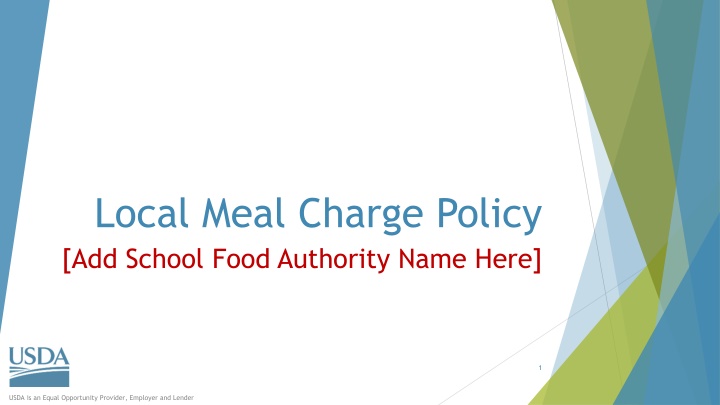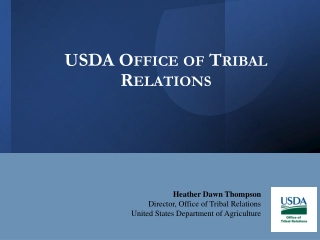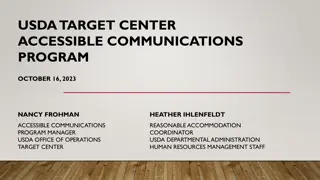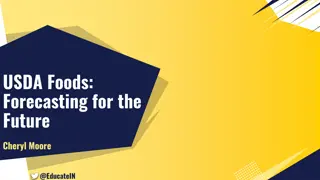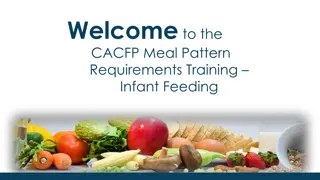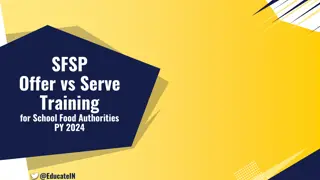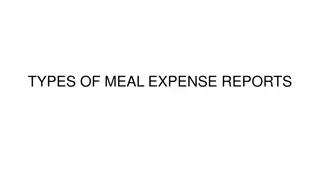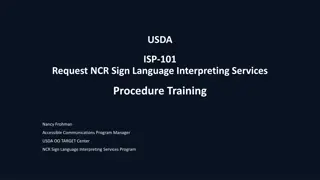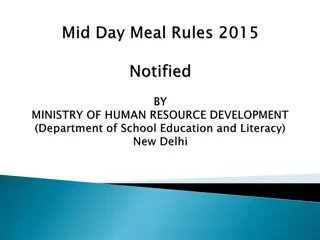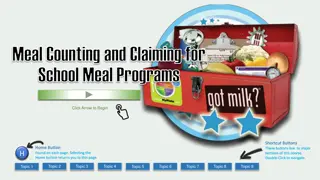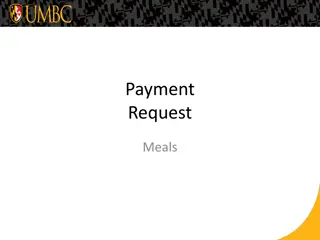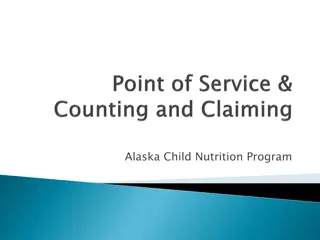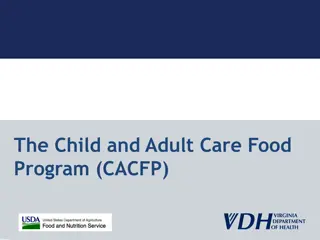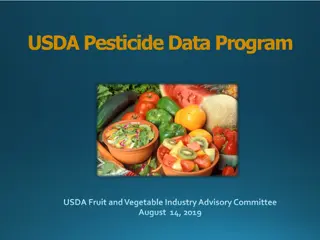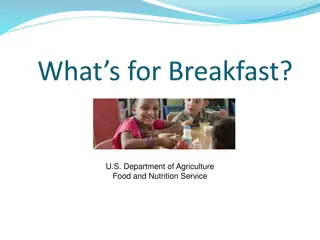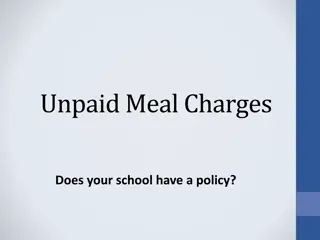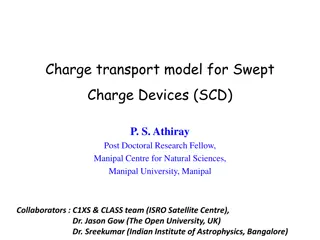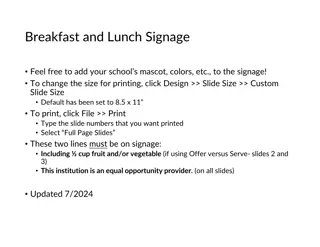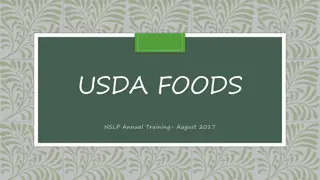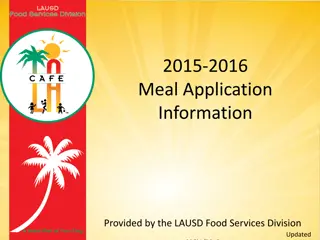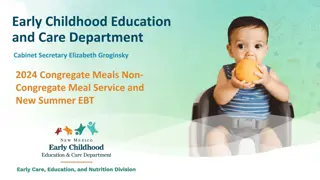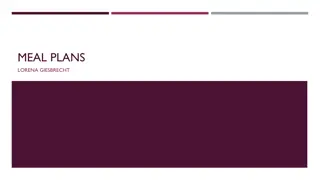Local Meal Charge Policy and USDA Requirements
The USDA requirement for local meal charge policies in schools, including the importance of communication and recordkeeping. Learn why a local approach is preferred and how SFAs can develop and implement effective policies to prevent unpaid meal charges and lunch shaming.
Download Presentation

Please find below an Image/Link to download the presentation.
The content on the website is provided AS IS for your information and personal use only. It may not be sold, licensed, or shared on other websites without obtaining consent from the author.If you encounter any issues during the download, it is possible that the publisher has removed the file from their server.
You are allowed to download the files provided on this website for personal or commercial use, subject to the condition that they are used lawfully. All files are the property of their respective owners.
The content on the website is provided AS IS for your information and personal use only. It may not be sold, licensed, or shared on other websites without obtaining consent from the author.
E N D
Presentation Transcript
Local Meal Charge Policy [Add School Food Authority Name Here] 1 USDA is an Equal Opportunity Provider, Employer and Lender
Todays Agenda Introductions USDA Requirement [SFA Name] s Local Charge Policy [SFA Name] s Policy Communication Strategy Preventing Unpaid Meal Charges Preventing Lunch Shaming Resources Questions and Answers 2
Introductions [Presenter 1 Name] [Presenter 1 Title] [Presenter 1 Background Information] [Presenter 2 Name] [Presenter 2 Title] [Presenter 2 Background Information] 3
Why Does USDA Require a Local Meal Charge Policy? In 2010, Congress required USDA to examine and report to Congress on charge and alternate meal policies Rather than adopt a Federal policy, USDA determined a local approach would work best for schools 5
USDA Requirement: Local Charge Policy All school food authorities (SFAs) operating the National School Lunch Program and/or School Breakfast Program must develop a meal charge policy SFAs have discretion in developing the specifics of their policies 6
USDA Requirement: Communication SFAs must communicate the policy, in writing, to: All families at the start of the school year Families with students who transfer mid-year SFAs must provide the policy, in writing, to any school or district-level staff members responsible for policy enforcement Best Practice: Share in multiple ways! 7
USDA Requirement: Recordkeeping SFAs must provide the policy to the State agency during the Administrative Review SFAs must maintain documentation of policy communication methods 8
USDA Recommendations Maintain the financial integrity of the Programs Provide children with adequate nutrition to learn Prevent lunch shaming of children with meal charges 9
[SFA Name]s Policy Development Process Possible examples include: Inviting key stakeholders to provide input Tracking unpaid meal charges over time in order to tailor the policy to the magnitude of the problem Investigating the reasons why children are accruing debt Reviewing USDA guidance materials 11
[SFA Name]s Local Charge Policy Make sure to address the following: How will families be notified of low/negative balances? Are children allowed to charge a meal? What are the consequences for failing to repay a debt? Are resources available to children with an unpaid balance? 12
[SFA Name]s Policy Communication Plan Make sure to address the following: How and when will families be notified of the policy? How and when will families transferring to the SFA mid-year be notified of the policy? How will staff members responsible for policy enforcement be notified of the policy? 13
Additional Communication Options Send home folder School website or social media Student handbooks Newsletters, cafeteria menus, etc. 14
Reach All Eligible Children Provide application assistance, especially for families with language or literacy barriers Improve direct certification systems 16
Reach Children Mid-Year Remind families they may submit an application at any time Accept prior eligibility status for transfer students 17
Provide Payment Options Pre-payment systems Online payment Automatic payment Repayment plans 18
Provide Payment Reminders Encourage families to track spending Remind families of a low balance BEFORE the account goes negative Make sure contact information is current 19
Offset Costs from Unpaid Meals Community donations Angel funds School fundraisers End of year donations 20
Communication Strategies Communicate privately with families about a child s outstanding balance Communicate payment reminders directly and discreetly to adults in the household Send payment reminders in a plain, white envelope 22
Avoid Singling Out Students Do not throw a child s meal in the trash if they are unable to pay! Do not identify children with meal charges using hand stamps, stickers, or other visual markers! 23
Always Aim for High Quality Alternate Meals Do not serve alternate meals that single out children with unpaid meal charges! 24
Other Considerations Consider costs vs. benefits of debt collection efforts Determine whether children may be eligible for free meals 25
Give Us Your Feedback! Our local charge policy will be reviewed on a regular basis Please let us know what s working, and what we can do better! 26
Resources [SFA Name] s Local Charge Policy: includes an overview of our policy requirement, publicly available via the web. [LINK] USDA s Unpaid Meal Charges Website: includes policy guidance, best practice resources, presentations, and other tools for schools! https://www.fns.usda.gov/school- meals/unpaid-meal-charges [Other Resources, As Applicable] 27
Thank You! [Presenter 1 Name] [Presenter 1 Title] [Presenter 1 Contact Information] [Presenter 2 Name] [Presenter 2 Title] [Presenter 2 Contact Information] 29
